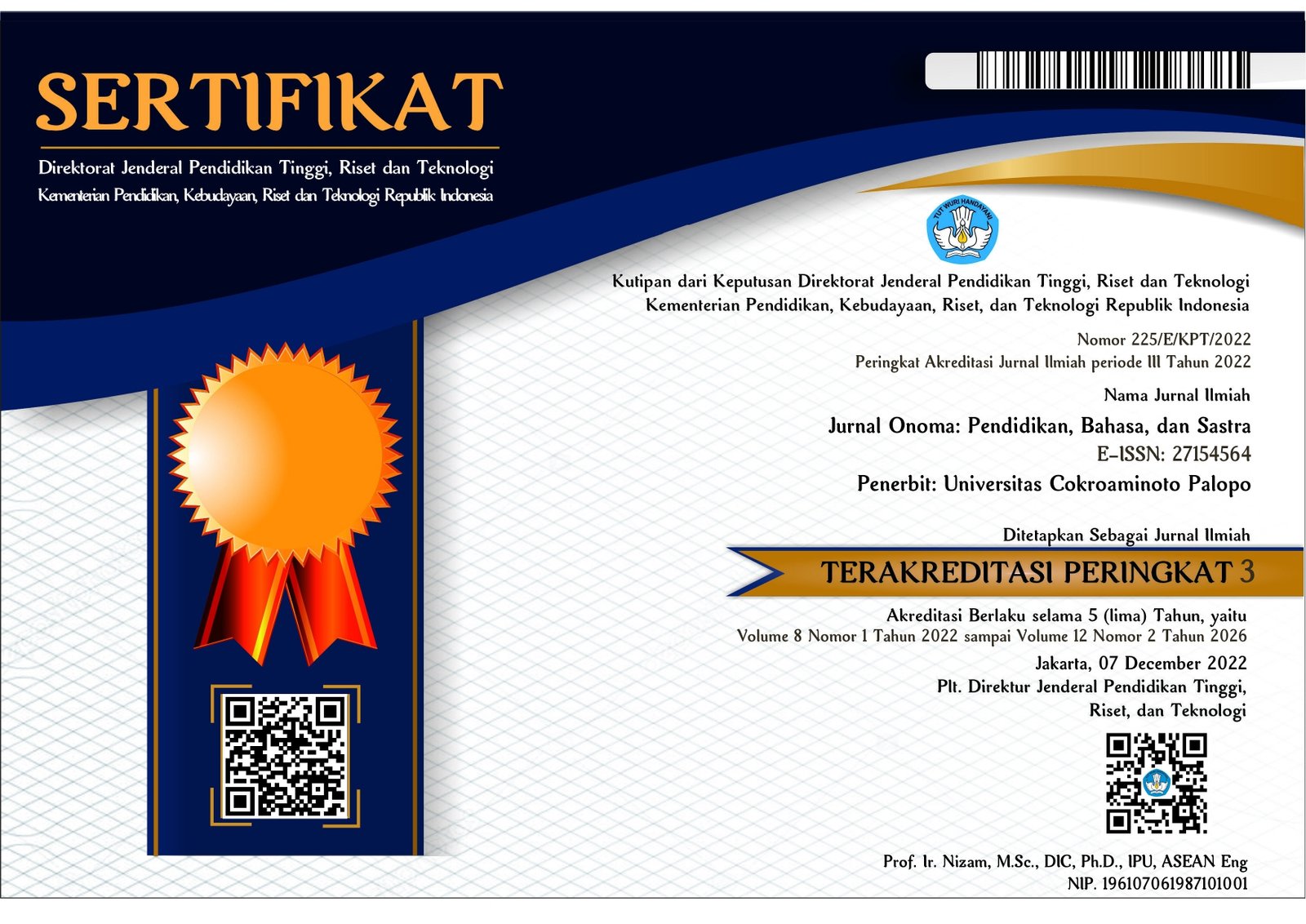Relasi Gender dalam Novel “Merpati Tak Pernah Ingkar Janji” Karya Mira W.
https://doi.org/10.30605/onoma.v11i1.5257
Keywords:
relasi gender, gender, feminisme, dampak psikologiAbstract
Tujuan utama dari penelitian ini adalah untuk mengaji novel ini dari segi feminisme serta dampak gender yang dialami tokoh dalam novel tersebut. Metode penelitian ini adalah metode deskriptif, penelitian ini mengamati dan menganalisis isi novel dengan pendekatan feminisme. Kajian ini diharapkan dapat memaparkan gagasan-gagasan feminisme pengarang yang ingin disampaikan kepada pembaca. Hasil penelitian menunjukkan bahwa Relasi gender meliputi perempuan sebagai inferior, perempuan sebagai mitra sejajar laki-laki, dan perempuan sebagai makhluk superior. Adanya relasi gender ini menimbulkan adanya ketidakadilan gender dan kesetaraan gender, sehingga memberi dampak psikologi pada tokoh novel. Dampak psikologi berupa kecemasan riil, kecemasan neurotik, dan kecemasan moral.
Downloads
References
Arikunto, S. (2006). Prosedur Penelitian: Suatu Pendekatan Praktik. Jakarta: Rineka Cipta.
Fitriannie, E. (2009). Konflik Batin Tokoh Utama dalam Cerpen Sri Sumarah karya Umar Kayam: Tinjauan Psikologi Sastra. Universitas Muhammadiyah Surakarta.
Kumalasari, R. (2020). Perempuan dan Keataan. SETARA: Jurnal Studi Gender Dan Anak, 2(2), 36–51. DOI: https://doi.org/10.32332/jsga.v2i2.2315
Mushodiq, M. A. M., & Saputra, A. A. (2021). Dinamika Kepribadian Amarah, Lamawah, dan Mutmainnah serta Relevansinya dengan Struktur Kepribadian Sigmund Freud. Bulletin of Counseling and Psychotherapy, 3(1).
Ningsi, S. (2022). Perlawanan Atas Kebebasan Perempuan Terhadap Budaya Patriarki dalam Novel Perempuan di Titik Nol karya Nawa El Saadawi.
Nurgiantoro, B. (1995). Teori Pengkajian Prosa Fiksi. Yogyakarta: Gajah Mada University Press.
Nurrahmah, Z. A., & Wahyuningtyas, S. (2019). Ketidakadilan Gender Terhadap Perempuan Dalam Novel Tempurung Karya Oka Rusmini: Pendekatan Feminisme Sastra. Caraka: Jurnal Ilmu Kebahasaan, Kesastraan, Dan Pembelajarannya, 5(2), 119–131. DOI: https://doi.org/10.30738/caraka.v5i2.4838
Panjaitan, F., & Stevanus, K. (2020). Ekualitas Antara Laki-Laki Dan Perempuan: Upaya Mereduksi Kekerasan Secara Domestik. Thronos: Jurnal Teologi Kristen, 1(2), 58–72. DOI: https://doi.org/10.55884/thron.v1i2.3
Sianturi, S. (2020). Analisis Struktural Novel Merpati Tak Pernah Ingkar Janji Karya Mira W.
Thuillier, B., Valentin, D., Marchal, R., & Dacremont, C. (2015). Pivot© profile: A new descriptive method based on free description. Food Quality and Preference, 42, 66–77. DOI: https://doi.org/10.1016/j.foodqual.2015.01.012
W, Mira. (2000). Merpati Tak Pernah Ingkar Janji. Jakarta: Gramedia Pustaka Utama.
Downloads
Published
How to Cite
License
In submitting the manuscript to the journal, the authors certify that:
- They are authorized by their co-authors to enter into these arrangements.
- The work described has not been formally published before, except in the form of an abstract or as part of a published lecture, review, thesis, or overlay journal.
- That it is not under consideration for publication elsewhere,
- That its publication has been approved by all the author(s) and by the responsible authorities – tacitly or explicitly – of the institutes where the work has been carried out.
- They secure the right to reproduce any material that has already been published or copyrighted elsewhere.
- They agree to the following license and copyright agreement.
License and Copyright Agreement
Authors who publish with Onoma Journal: Education, Languages??, and Literature agree to the following terms:
- Authors retain copyright and grant the journal right of first publication with the work simultaneously licensed under Creative Commons Attribution License (CC BY 4.0) that allows others to share the work with an acknowledgment of the work's authorship and initial publication in this journal.
- Authors are able to enter into separate, additional contractual arrangements for the non-exclusive distribution of the journal's published version of the work (e.g., post it to an institutional repository or publish it in a book), with an acknowledgment of its initial publication in this journal.
- Authors are permitted and encouraged to post their work online (e.g., in institutional repositories or on their website) prior to and during the submission process, as it can lead to productive exchanges, as well as earlier and greater citation of published work.

















